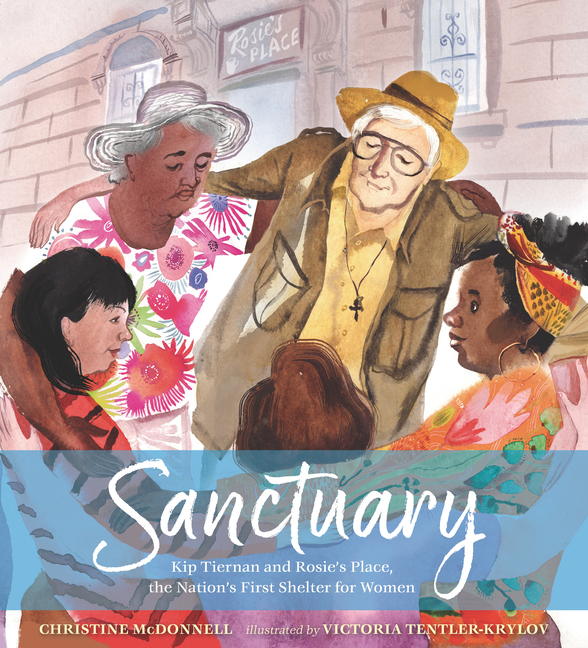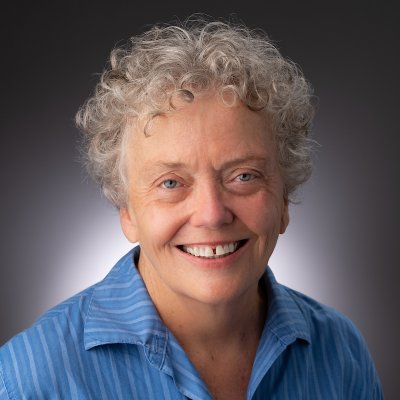Meet-the-Author Recording with Christine McDonnell
Sanctuary: Kip Tiernan and Rosie's Place, the Nation's First Shelter for Women |
Christine McDonnell introduces and shares some of the backstory for creating Sanctuary: Kip Tiernan and Rosie's Place, the Nation's First Shelter for Women.
Translate this transcript in the header View this transcript Dark mode on/off
Christine McDonnell: Hello. My name is Christine McDonnell. I am the author of Sanctuary: Kip Tiernan and Rosie's Place, the Nation's First Shelter for Women, illustrated by Victoria Tentler-Krylov. The title of our book is Sanctuary. A sanctuary is a safe place, a place of refuge. Kip Tiernan, a Boston activist, wanted to create a shelter for women that would be a sanctuary. I never met Kip. She died in 2011, a few years before I visited Rosie's Place, the sanctuary that she created. I helped make and serve dinners there. Kip Tiernan's photograph hangs in the dining room. Many of the guests would ask me if I had known Kip. "She was something else," they said, pointing to her photograph.
After that, I began teaching English and literacy at Rosie's Place. Many of the women in my classes had not had the opportunity to go to school beyond just a few years. Some had never been to school at all because women were not educated in the countries that they came from. It cost money to be educated. They could not read or write in their native language. Over the years, my students at Rosie's Place taught me so much about being resilient, about being positive. They were so grateful to have the opportunity to learn. And I learned a lot from them about the struggles they had overcome and the challenges in their lives now.
Once I decided to write about Kip, I spent weeks in the library, reading her papers -- speeches and letters, notes, leaflets, interviews, newspaper articles. Kip was an excellent writer and speaker. She had a background in advertising and public relations, and she knew the value of a good line. Here are a few of my favorites of hers. She would say, "Who decides who gets the condo and who gets the cardboard box?" And then another saying of hers that appears a lot is, "Never forget that charity is scraps from the table and justice is a seat at the table. Charity is giving to others what belongs to you, but justice is giving to others what belongs to them."
I hope that as many children as possible learn about Kip Tiernan and her work, because she had such empathy for people, people quite different from herself. And she didn't see them as different from herself at all. She saw them as the same. "This could be me."
The first selection I'm going to read is from the beginning of Sanctuary when Kip is a little girl.
Kip stood on tiptoe to stir the big pot of soup on Granny's stove. Already men were lining up by the back door, collars turned up and shoulders hunched against the cold. Some blew on their hands to keep them warm. Granny ladled the soup, and Kip carried the steaming bowls outside.
It was during the Great Depression of the 1930s when many people lost their savings, jobs, and even their homes. Men, women, and children begged on street corners for money or food. Some left chalk marks on the sidewalk as guides for other needy people. The mark outside Granny's house signaled that it was a good, safe place to be fed.
After Kip's father died when she was an infant, Kip was raised in Granny's house She was named Mary Jane after both grandmothers, but everyone called her Kippie. With many of her ten children living at home, Kip's grandmother already had plenty of people to feed. But she always gave food to those who knocked on her kitchen door. She gave whatever she could. When a man needed shoes, she gave away a pair belonging to her son. She even gave away a shaving kit. In her grandmother's kitchen, Kip learned to be generous and to care about others.
"Why are we feeding those men, Granny?" Kip asked. "We don't even know them."
"I don't have to know them to know that they're hungry, that they're good men who have come upon hard times," her grandmother said. "We're a lot better off than the people who come to our door."
In the 1970s, when Kip was grown, she noticed that women who needed shelter were not being provided for. She decided to open a shelter for women.
This Meet-the-Author Recording with Christine McDonnell was exclusively created in May 2022 by TeachingBooks with thanks to Candlewick Press.




